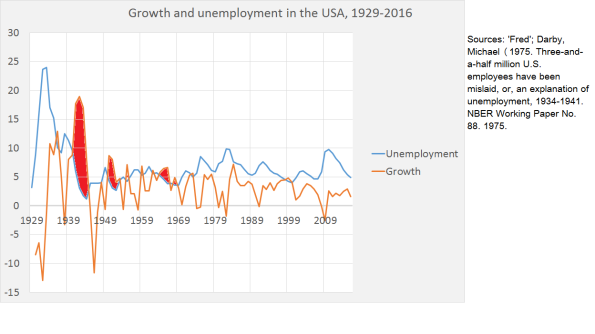According to D. Trump “The GDP rate (4,2%) is higher than the unemployment rate (3,9%) for the first time in over 100 years!”. This tweet. Comparing the rate of GDP growth with the unemployment rate surely is interesting. And situations where the unemployment rate is lower than the rate of growth (U
Topics:
Merijn T. Knibbe considers the following as important: Uncategorized
This could be interesting, too:
tom writes The Ukraine war and Europe’s deepening march of folly
Stavros Mavroudeas writes CfP of Marxist Macroeconomic Modelling workgroup – 18th WAPE Forum, Istanbul August 6-8, 2025
Lars Pålsson Syll writes The pretence-of-knowledge syndrome
Dean Baker writes Crypto and Donald Trump’s strategic baseball card reserve
According to D. Trump “The GDP rate (4,2%) is higher than the unemployment rate (3,9%) for the first time in over 100 years!”. This tweet. Comparing the rate of GDP growth with the unemployment rate surely is interesting. And situations where the unemployment rate is lower than the rate of growth (U<G) are rare and remarkable as well as agents of change.
D. Trump is wrong about the economic history of these events (graph). During WW II as well as during quite some years in the fifties and the sixties growth was higher than the unemployment rate, too. While the thirties show that we have to account for high rates of legacy unemployment. Using, as D. Trump does, annualized quarterly data would surely show more episodes. Even then, 1999 was the last time, which isn’t over 100 years ago. And personally, I would be delighted to get the source of his unemployment data for the period before 1929.
 Having stated this, I totally agree that the ‘U<G’ situation surely is worth a presidential tweet! Josh Mason has been lambasted for pointing out the possibility for strong growth even when unemployment is low. Turns out he was right after all. Too bad we needed the policies of an egomaniac to proof this. For progressive economists, there is a lesson to be learned, here. Let’s go for a ‘BU<G’ situation, ‘B’ standing for ‘Black’.
Having stated this, I totally agree that the ‘U<G’ situation surely is worth a presidential tweet! Josh Mason has been lambasted for pointing out the possibility for strong growth even when unemployment is low. Turns out he was right after all. Too bad we needed the policies of an egomaniac to proof this. For progressive economists, there is a lesson to be learned, here. Let’s go for a ‘BU<G’ situation, ‘B’ standing for ‘Black’.
